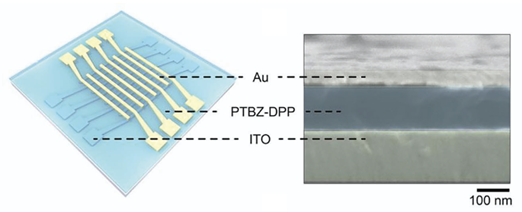Temperature-Resilient Polymeric Memristors for Effective Deblurring in Static and Dynamic Imaging
Lv, Ziyu ; Jiang, Ming‐Hao ; Liu, Hui‐Ying ; Li, Qing‐Xiu ; Xie, Tao ; Yang, Jingya ; Wang, Yan ; Zhai, Yongbiao ; Ding, Guanglong ; Zhu, Shirui ; Li, Jia‐Hua ; Zhang, Miao ; Zhou, Ye ; Tian, Bobo ; Wong, Wai‐Yeung ; Han, Su‐Ting
Advanced Functional Materials • Published on 24 January 2025
Organic memristors have emerged as promising candidates for neuromorphic computing due to their potential for low-cost fabrication, large-scale integration, and biomimetic functionality. However, their practical applications are often hindered by limited thermal stability and device-to-device variability. Here, an organic polymer-based memristor using a thiadiazolobenzotriazole (TBZ) and 2,5-Dioctyl-3,6-di(thiophen-2-yl)pyrrolo[3,4-c]pyrrole-1,4(2H,5H)-dione (DPP)-based conjugated polymer is presented that exhibits exceptional thermal stability and reliable resistance switching behavior over a wide temperature range (153–573 K). The device leverages a charge-transfer mechanism to achieve gradual and uniform resistance switching, overcoming the challenges associated with filamentary-based mechanisms. The memristor's exceptional thermal stability and consistent performance enable its integration into various applications, including image processing. The device's ability is demonstrated to effectively deblur images, even under varying temperature conditions, showcasing its potential for robust and reliable neuromorphic computing. This study establishes a pathway toward high-performance, thermally stable organic memristors for advanced neuromorphic computing and artificial intelligence applications.



